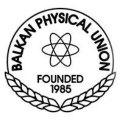Speaker
Description
The paper starts with a brief discussion of research studies investigating students’ misconceptions related to physics concepts, ideas and laws1. Then, we discuss the rich information on undergraduate students’ understanding when research focuses on investigating students’ reasoning in various areas of physics2, 3. The main body of the paper reports on recent research on undergaduate physics students’ reasoning when they evaluate experimental measurements in the laboratory4. Secondly, we present ongoing research investigating students’ reasoning when they analyze experimental data in the context of physics lab reports. The focus is on how they use best fist lines and curves and appropriate formulas linked to their reasoning behind various approaches. The paper concludes with implications for physics instruction, assessement and physics education research. The main argument is that physics instructors need to develop open-ended tasks in which they ask undergraduate physics students to demonstrate their full reasoning. The aim is for instructors to make sense of particular difficulties in order to address them in follow-up instruction.
References
1. J. Clement, Am. J. Phys. 50, 66 (1982)
2. L. C. McDermott, L. C. 67, 755 (1999)
3. L. Viennot, Am. J. Phys. 53, 432 (1985)
4. P. Van Kampen et al., Eur. J. Phys. 42 (2021)

